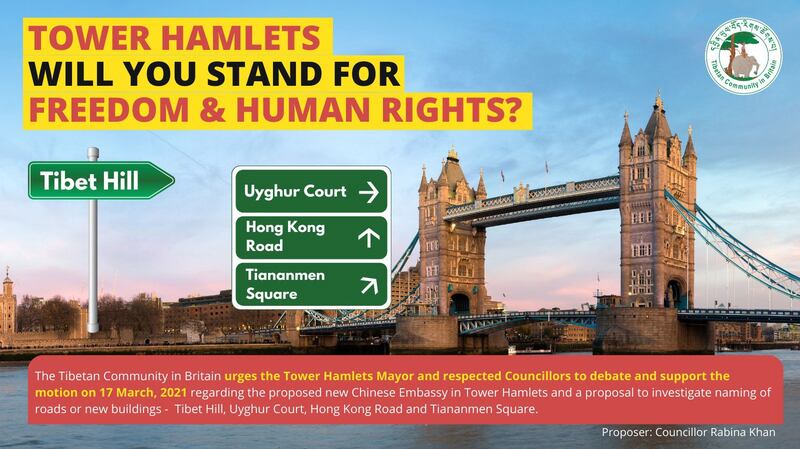Diplomats working at a Chinese Embassy to be built in the borough of Tower Hamlets in London’s East End should be reminded each day of their government’s treatment of Tibetans and other groups ruled harshly by Beijing, says a Borough councilwoman who has proposed the renaming of local streets.
“In Tower Hamlets, we have a rich history of standing up for people,” said councilwoman Rabina Khan, speaking to RFA’s Tibetan Service in a recent interview, saying she will bring a motion to the full Borough Council on Wednesday asking that areas near the new embassy’s location be named in solidarity with people “oppressed by the Chinese Communist Party.”
“It’s my fourth time to bring this motion,” Khan said, “and this time I’ve also included a place called Tibet Hill, to remember the people of Tibet, and also to name [other] locations near there as Tiananmen Square, Uyghur Court, and Hong Kong Road.”
Khan, a Bangladeshi-born writer and community development activist, is a member of the Liberal Democratic Party.
Speaking to RFA, Khan urged everyone listening to her interview to lobby the Tower Hamlets Council to agree to the motion.
A request to fly the banned Tibetan national flag at Borough offices on March 10, the anniversary of a failed 1959 Tibetan uprising against Chinese rule, had earlier been turned down by the borough’s mayor, but Khan and fellow Borough Councilor Peter Gold then held up the Tibetan flag outside Borough offices themselves.
"I'm just very humbled that I can stand up for the people of Tibet, the Uyghur Muslims, and the people of Hong Kong, and all those who have been oppressed by the Chinese government. Not by the people of China, but by the Chinese Communist Party," Khan told RFA.
“Tower Hamlets Borough is a significant political location, as the Chinese Embassy has been proposed to relocate there,” said Thinley Dhondup, Secretary of the Tibetan Community UK.
“And ever since we Tibetans learned that Rabina Khan has proposed [the renaming of the streets], we Tibetans have felt it was important to urge the mayor to raise the Tibetan flag on Tibetan Uprising Day,” he said.

Tower Hamlets Mayor John Biggs said that Khan's plans would have to go through the normal review process, but that the borough backed such expressions of solidarity with oppressed people.
‘’While we may welcome the Chinese embassy to our borough in the future, we will of course not refrain from expressing the views of the Council, on behalf of our community, or asserting our support for the freedom and diversity of our borough," he told RFA.
"We are home to a large number of Muslim residents and there is no doubt that the reported treatment of the Uyghurs represents everything our community is against. Tower Hamlets has a proud tradition of fighting racism and will always will be No Place for Hate.’’
Formerly an independent nation, Tibet was invaded and incorporated into China by force nearly 70 years ago, and Tibet’s spiritual leader the Dalai Lama and thousands of his followers later fled into exile in India and other countries around the world following the failed 1959 uprising against Chinese rule.
In northwestern China’s Xinjiang Uyghur Autonomous Region (XUAR), China has meanwhile interned over a million Uyghur Muslims accused of “religious extremism” in political reeducation camps, while in Hong Kong, a national security law imposed last year by Beijing has removed the Chinese Communist Party’s political opposition and stifled the freedoms promised under the terms of the city’s return to China by its former colonial ruler Britain.
Reported and translated by Tashi Wangchuk for RFA’s Tibetan Service. Written in English by Richard Finney.
